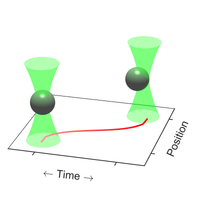Universal Symmetry of Optimal Control at the Microscale
IF 11.6
1区 物理与天体物理
Q1 PHYSICS, MULTIDISCIPLINARY
引用次数: 0
Abstract
Optimizing the energy efficiency of driving processes provides valuable insights into the underlying physics and is of crucial importance for numerous applications, from biological processes to the design of machines and robots. Knowledge of optimal driving protocols is particularly valuable at the microscale, where energy supply is often limited. Here, we experimentally and theoretically investigate the paradigmatic optimization problem of moving a potential carrying a load through a fluid, in a finite time and over a given distance, in such a way that the required work is minimized. An important step towards more realistic systems is the consideration of memory effects in the surrounding fluid, which are ubiquitous in real-world applications. Therefore, our experiments were performed in viscous and viscoelastic media, which are typical environments for synthetic and biological processes on the microscale. Despite marked differences between the protocols in both fluids, we find that the optimal control protocol and the corresponding average particle trajectory always obey a time-reversal symmetry. We show that this symmetry, which surprisingly applies here to a class of processes far from thermal equilibrium, holds universally for various systems, including active, granular, and long-range correlated media in their linear regimes. The uncovered symmetry provides a rigorous and versatile criterion for optimal control that greatly facilitates the search for energy-efficient transport strategies in a wide range of systems. Using a machine learning algorithm, we demonstrate that the algorithmic exploitation of time-reversal symmetry can significantly enhance the performance of numerical optimization algorithms.

微尺度优化控制的普遍对称性
优化驱动过程的能效可以提供对基础物理学的宝贵见解,对于从生物过程到机器和机器人设计等众多应用都至关重要。在能量供应往往有限的微观尺度上,最优驱动协议的知识尤其宝贵。在这里,我们通过实验和理论研究了一个典型的优化问题,即在有限的时间内,在给定的距离内,通过流体移动一个携带负载的势能,使所需的功最小化。考虑周围流体中的记忆效应是实现更逼真系统的重要一步,而记忆效应在实际应用中无处不在。因此,我们的实验在粘性和粘弹性介质中进行,这些介质是微尺度合成和生物过程的典型环境。尽管两种流体中的控制协议存在明显差异,但我们发现最优控制协议和相应的粒子平均轨迹始终服从时间反转对称性。我们表明,这种对称性出人意料地适用于一类远离热平衡的过程,它普遍适用于各种系统,包括线性状态下的活动介质、颗粒介质和长程相关介质。未发现的对称性为优化控制提供了一个严格而通用的标准,极大地促进了在各种系统中寻找节能传输策略的工作。我们利用机器学习算法证明,在算法上利用时间反转对称性可以显著提高数值优化算法的性能。
本文章由计算机程序翻译,如有差异,请以英文原文为准。
求助全文
约1分钟内获得全文
求助全文
来源期刊

Physical Review X
PHYSICS, MULTIDISCIPLINARY-
CiteScore
24.60
自引率
1.60%
发文量
197
审稿时长
3 months
期刊介绍:
Physical Review X (PRX) stands as an exclusively online, fully open-access journal, emphasizing innovation, quality, and enduring impact in the scientific content it disseminates. Devoted to showcasing a curated selection of papers from pure, applied, and interdisciplinary physics, PRX aims to feature work with the potential to shape current and future research while leaving a lasting and profound impact in their respective fields. Encompassing the entire spectrum of physics subject areas, PRX places a special focus on groundbreaking interdisciplinary research with broad-reaching influence.
 求助内容:
求助内容: 应助结果提醒方式:
应助结果提醒方式:


